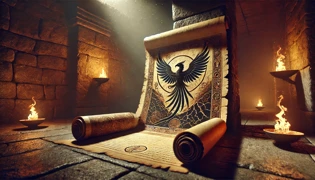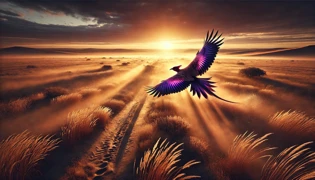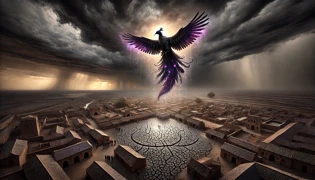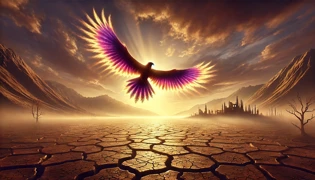Introduction
Far beyond the rolling hills and golden grasslands of the Great Karoo, the kingdom of Elandra lay parched under a merciless sun. Day after day, the sky remained a cloudless, cobalt expanse offering no mercy against cracked earth and withered crops. The air shimmered with heat and tension as farmers trudged between brittle fields, their sandals raising dust into the still atmosphere. Streams that once wound through the valleys shrank to narrow trickles, leaving fish stranded on barren banks. Families gathered under sparse shade, hands pressed against dry soil, faces etched with worry. Each dawn delivered another cruel reminder that the land’s pulse had been stifled by unrelenting drought. Merchant caravans that once bustled with traders slowed to a halt. With every empty wagon, hope thinned like whispered prayers in empty temples. The songs of morning birds fell silent, as though the earth itself refused to sing. In this desperate hour, the people of Elandra turned their eyes and hearts toward an ancient promise hidden in mists of memory and myth. According to legend, when the parched earth cried for mercy, the Rain Bird would traverse distant horizons, its iridescent plumage stirring clouds into motion. With a single beat of its mighty wings, raindrops would burst forth to quench the thirst of all living beings. But centuries had passed since any sighting or omen, and the memory of that miraculous migration had become little more than bedtime stories. Now, as elders gathered in council beneath the crumbling ruins of an old temple, hope flickered with newfound urgency. They recalled fragments of a prophecy carved into faded stone: that a humble guardian, chosen by the spirits of wind and water, would lead the Rain Bird home and restore life to the land. Under a sun that burned without mercy, a young acolyte named Tshaka quietly vowed to heed that call. Armed only with faith, a simple staff, and the blessing of his people, he prepared to follow a dream that could either save Elandra or vanish like mist under the relentless glare of a drought-stricken sky.
The Drought and the Prophecy
Far beyond the rolling hills and golden grasslands of Elandra, every living soul felt the weight of an unending drought. The kingdom’s heart lay bare under a sky that refused to yield clouds. Day after unbearable day, the earth cracked and the once-thriving savanna withered into dusty plains. Harvests that once feasted the masses dwindled to handfuls of grain, and granaries echoed with emptiness. Village wells dried to parched mouths, begging for breath. Farmers stood with bowed heads beneath a blazing sun that offered no mercy, their skin scorched and their spirits frayed. In the towns and hamlets that dotted the realm, mothers rocked their infants beneath awnings of fading fabric, desperately rationing the last drops of water. Children, hollow-eyed and silent, roamed the dusty streets searching for any sign of relief. The wind, once a gentle caress, now felt like a scorching blade, slicing into flesh and hope alike.

Amid this agony, the palace council convened beneath the crumbling arches of an ancient temple. Elder Njala, keeper of sacred lore, traced her fingers over faded symbols carved into stone. Each glyph spoke of a creature born beyond mortal ken: the Rain Bird, whose wings summoned storms, whose song coaxed clouds to gather, whose presence turned arid soil to fertile ground. According to the prophecy, a guardian chosen by fate would guide the Rain Bird across distant skies back to Elandra. This chosen one would stand at the kingdom’s brink and call upon wind and water spirits to honor their ancient pact. Njala’s voice quivered like the last embers of a dying fire as she recited the verses, reminding the council that time had grown perilously short.
Legends told that the Rain Bird dwelled where the horizon met the heavens, beyond the reach of mortal eyes. Its plumage shimmered with every hue of the rainbow; its eyes glowed like twin sapphires at midnight. It called upon the winds of the east and west, weaving currents of air into swirling vortexes that carried life-giving rain. Once summoned, the Bird’s journey spanned continents and seas, gathering moisture until its wings trembled with the weight of countless droplets. But the power to restore life could only be unlocked by one who held true purity of heart and unwavering courage in the face of despair.
As elders debated and the people despaired, a humble acolyte named Tshaka knelt in silent prayer within the temple’s shadows. He had grown up in a farming village east of the capital, watching his parents toil beneath a merciless sky. He had learned to read the signs of wind and clouds, to listen for whispers in the rustle of dry leaves. Njala noticed his keen gaze and gentle spirit and believed he might be the one foretold by prophecy. She beckoned him forward, placing a simple staff carved with water emblems into his trembling hands. With those few humble tokens, Tshaka felt both the gravity and honor of his quest. As the council sealed his fate with solemn vows, Tshaka vowed to journey wherever the spirits guided, to bring the Rain Bird home or return as dust upon a dying land.
At dawn, while the kingdom still slumbered under cruel skies, Tshaka stepped beyond the temple gates. He carried only the staff, a flask of stored water, and the fragmented prophecy etched upon a wooden tablet. His heart pounded like a drumbeat, echoing the desperation of countless souls. With each heavy footstep, he felt the eyes of Elandra’s people upon him—their hopes tethered to his courage. And so, with a final prayer to water and wind, the chosen guardian began his pilgrimage across scorched earth, driven by faith stronger than fear.
Across the Great Thirst
Tshaka’s journey led him eastward across the endless Karoo plains, where the sun hovered like a merciless sentinel. Every morning he rose before dawn, guiding his path by distant mountain silhouettes etched faintly on the horizon. He carved runes of protection into tree bark and murmured prayers to hidden springs beneath the sands. As he walked, he recited the prophecy aloud, believing that his voice might awaken the spirits of sky and water. Days blurred into a continuum of dust and heat; nights offered little comfort beyond a brief reprieve under a moonless sky.

On the sixth dawn, as his flask dwindled, Tshaka spotted a flicker of movement on a rocky outcrop. A desert fox approached, its coat dull and its ribs visible beneath the skin. The creature lay its head on Tshaka’s ankle, eyes brimming with unspoken pleas. Remembering the old stories of animals as messengers of the unseen, Tshaka knelt and offered a few precious droplets of water. The fox drank as if the entire desert had parted to fill his cup. When it finished, it stood and met Tshaka’s gaze, as though affirming his purpose. Then, with a gentle tilt of its head, it turned and vanished into a ravine. Tshaka took this as a sign, pressing on toward the distant hills the fox had indicated.
His path led him into the foothills that marked the border of the Storm Mountains, jagged peaks that scraped the belly of the sky. There, thunderclouds gathered in silent congress, promising relief or wrath. Tshaka climbed through narrow passes and over treacherous stones, ever mindful of carved markers left by earlier pilgrims. Along the way, he encountered herds of antelope, their gaunt frames testament to the ordeal of the drought. He fed them handfuls of dried sorghum, sharing his own meager rations with creatures that would likely perish without mercy. As he moved farther from human settlements, the world grew wilder, untamed by mortal hands.
On the seventh evening, Tshaka found himself atop a windswept plateau where the air pulsed with latent energy. He laid out the wooden tablet under a sky roiling with storm clouds and recited the prophecy in its entirety. The wind stilled, and the very hairs on his arms stood on end. In the distance, a vast shape descended from the darkening heavens, wings unfolding like living canvases painted with every shade of twilight. The Rain Bird had come. Its arrival set the plateau aglow—droplets condensed around its feathers, creating a halo of mist that shimmered in the fading light. For a moment, Tshaka felt the full weight of destiny press upon him: to guide this celestial creature home, to breathe life back into a land that had forgotten the mercy of water.
With unwavering resolve, Tshaka raised his staff and called upon the ancient words of summoning. His voice rang clear across the plateau, echoing off stone and cloud. The Rain Bird circled once—twice—its sapphire eyes locking onto the young guardian’s. Then, with a mighty cry that shook the heavens, it spread its wings for the long flight south. Tshaka ran to catch up, staff aloft, heart pounding with awe and fear. As they plunged into the swirling winds, every droplet on the Rain Bird’s plumage shone like a promise yet to be fulfilled. Together, mortal and myth embarked on the final leg of their voyage, racing against time and parched earth beneath them.
The Descent and the Downpour
As the twin figures of guardian and Rain Bird descended toward Elandra, the land below lay baked and silent, every furrow in the fields a testament to months of suffering. Villagers gathered on rooftops and hilltops, their eyes fixed on the horizon where dark clouds churned like an approaching storm of justice. Each heartbeat echoed with anticipation—Iamed a thunderous drum, heralding that salvation was at hand. Tshaka and the Rain Bird pierced the final layers of cloud, and a hush settled over the kingdom as if even the wind held its breath.

When they broke free into golden afternoon light, the Rain Bird hovered above the central plaza of the capital city. Its wings beat slowly, sending ripples through the oppressive heat. Never before had Elandra’s people witnessed such spectacle. They fell to their knees, raising arms in reverence. Tshaka placed his staff on the cracked marble beneath him and stepped back, allowing the creature to perform its ancient ritual. The Rain Bird bowed its head, eyes like polished sapphires reflecting hope itself. A low hum emanated from deep within its chest, a vibration that spread outward until the very stones trembled.
Then, with a flap of wings that carried the weight of all the world’s water, the skies opened. At first, droplets fell like hesitant whispers, quivering above the dust. Then the heavens roared as rivers of rain cascaded from the blackened clouds. Streets became streams, fountains overflowed with crystal arcs, and parched fields drank greedily. Children laughed in the drenched dust, raising faces to the sky as if testing the reality of this gift. Farmers wept among newly saturated soils, tasting hope on their tongues. Rooftops glistened, wooden beams exhaled relief, and entire villages came alive in a symphony of revival.
Throughout the city, the transformation felt miraculous. The festival drums of old spontaneously beat again, echoing through alleyways and byways. Choirs assembled beneath newly green trees, singing hymns for the rain that had returned. Even the palace guards, steadfast in their posts, loosened their stances to greet the downpour with open palms. In that moment of universal rejoicing, Priestess Njala and King Thabani knelt beside Tshaka to honor the sacred bond between mortal and myth.
As the first thunder rolled away to the east, the Rain Bird spread its wings one final time. It soared into the clouds it had summoned, leaving behind a world reborn. Tshaka watched until its silhouette vanished against the silver lining of heaven. Though the creature had departed, its essence lingered in every droplet that kissed the earth. The drought was broken, the prophecy fulfilled, and Elandra thrived once more under gentle rains and grateful hearts. Tshaka returned the staff to Njala, who placed it within the temple archive for generations yet unborn. But the true legacy belonged to the Land, renewed by faith, perseverance, and the timeless miracle wrought by the Rain Bird’s flight.
Conclusion
In the days that followed, Elandra blossomed into a land of abundance once more. Rivers swelled, fields ripened under gentle showers, and the air carried the fragrance of soaked earth and new blossoms. Mother trees uprooted slender shoots of green, and herds of animals returned to the valleys they once abandoned. But beyond the physical revival, the kingdom discovered a deeper transformation of spirit. Neighbors shared water from communal wells. Youths carried buckets to thirsty elders, and travelers found shelter beneath open doors without question. Songs of the Rain Bird echoed through marketplaces and hearthside gatherings, a reminder that unity and faith can stir the very forces of nature.
Tshaka, once a humble acolyte, was hailed as the Rainkeeper, guardian of the sacred bond between Elandra and the skies. He traveled from village to village, teaching the ancient rites of reverence for wind, cloud, and water. Under his guidance, people learned to read the subtle signs of gathering storms, to respect the delicate balance of earth and sky. Though he never saw the Rain Bird again, he felt its presence in every thunderclap and every rainbow that arched across a thirsty horizon. Njala chronicled his journey, ensuring that the tale would endure long after memory faltered.
Centuries passed, and kings rose and fell, yet the legend of the Rain Bird’s Flight remained woven into the tapestry of Elandra’s heritage. Every drought brought flickers of anxiety that melted into hopeful remembrance of a guardian’s quest and a miraculous migration. Travelers came from distant realms to hear the story, to feel the echoes of that first storm that changed a kingdom’s fate. In homes around crackling hearths, storytellers spoke of perseverance as they spoke of the bird. In fields of golden grain, farmers whispered blessings to the clouds. And beneath every sky—clear or storm-clad—people remembered that even the driest heart can be awakened by a single spark of faith, a single beat of celestial wings. Thus, the Rain Bird’s Flight endures as an eternal testament to the life-giving power of belief and the unbreakable bond between humankind and nature’s blessings.
And so, whenever the parched earth cries out, the memory of the Rain Bird guides the faithful to look beyond despair and call upon the ancient promise once more. For in the dance of wind and rain, in the symphony of falling drops, lies the enduring truth that no drought is endless and no hope wholly lost. In Elandra, life forever follows the flight of that mythical creature, whose very passage awakens the heavens to pour their grace upon the world below. The Rain Bird’s flight remains an ever-present song, a melody of renewal carried on the wings of perseverance and love for the land it once saved and will save again whenever the skies grow silent and the earth turns to dust upon our prayers for mercy and life restored to every thirsty root and heart alike.

















